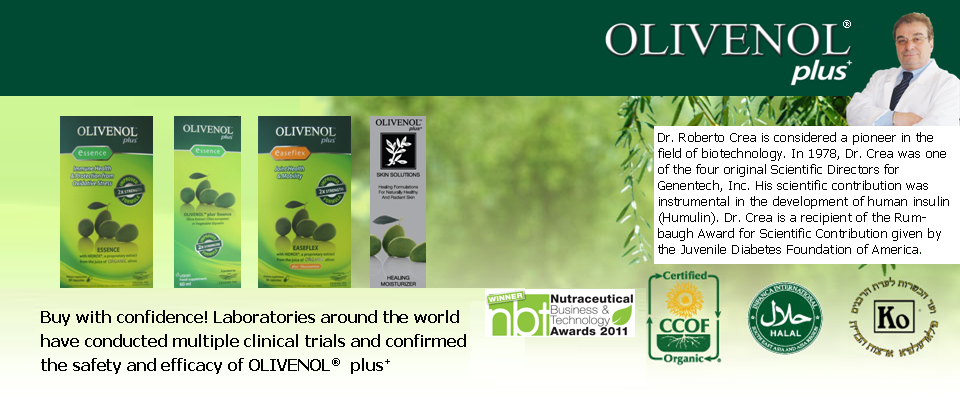While
nutraceuticals and dietary supplements undergo regulatory scrutiny for a
perceived lack of verifiable claims, CreagriⓇ Inc., continues to achieve new scientific
advancements on the road to producing healthy consumer goods.
Hayward, CA - April 26, 2012 - While
nutraceuticals and dietary supplements are coming under increasing regulatory
scrutiny, both in the United States and Europe, for what is perceived to be a
lack of verifiable scientific research supporting their claim to beneficial
health effects, CreagriⓇ Inc., and HidroxⓇ--its patented formulation
of olive polyphenols rich in the potent antioxidant Hydroxytyrosol—continue to
achieve new scientific advancements on the road to producing healthy consumer
goods.
According to the Canadian Medical Association
Journal (Apr. 17, 2012) consumers seek solutions to their health needs with
proven clinical outcomes, backed by sound scientific evidence and reproducible
test results.
In this area, the dietary supplement industry
falls short of the mark. for example a recent an NBC Dateline report highlighted
the problem of under-reported levels of selenium levels in some liquid vitamin
products, and the practice of “dry labbing”, whereby a company claims to have
done scientific research with its product when in fact, the research has been
done by another institution with a similar ingredient or with a different
product altogether. A spike in dry labbing claims was registered recently when
the EFSA (the European Food Safety Agency, analogous to the FDA in the United
States) announced that it was allowing claims relating to the beneficial
effects of olive polyphenols and hydroxytyrosol in the prevention of LDL
oxidation. Manyany companies promoting olive derived products quickly claimed
this finding as their own while in reality very few may be able to show any
study, let alone clinical trials, done with their product. This is not the case
for CreAgriⓇ Inc., which starting in 1999 has conducted
and published in peer-reviewed journals a number of human clinical trials and
laboratory tests with its products, HidroxⓇ and OlivenolⓇ plus. These studies
are not only in the cardiovascular arena, but also in other inflammation driven
conditions such as psoriasis, osteo and rheumatoid arthritis and
neuroinflammation. Furthermore, EFA’s established minimum daily dosage of 5mg
hydroxytyrosol came as no surprise to CreAgriⓇ. In fact, this was
the daily dose of hydroxytyrosol that was adopted by the Tokyo Vascular Disease
Institute and at the University of Arizona in two ground breaking clinical
trials with HidroxⓇ where a formulation of OlivenolⓇ, 2 capsules/day,
containing a total of 600 mg of HidroxⓇ 2% was given to
patients with cardiovascular and arthritic conditions.
Now two new fundamental studies about the
antibacterial and the neuroprotective effects of HidroxⓇ have been published
by the Journal of Agricultural and Food Chemistry and AgroFOOD Industry HiTech,
two preeminent peer reviewed journals. The first study, by researchers at the
USDA Regional Field Office, in Albany, California, has established the efficacy
of HidroxⓇ in inactivating E. coli and reducing the
formation of carcinogenic amines in cooked beef patties. The second research
study, a collaboration with scientists at The Parkinso’s Institute in
Sunnyvale, CA., CreAgri has confirmed the efficacy of Hidrox® in inhibiting
cytokine production in a Parkinson’s cell based model of neuroinflammation.
“Scientific research with Hidrox®) has
registered positive results in the first quarter of 2012”, declares Dr. Roberto
Crea, CreAgriⓇ’s CEO, and CSO. “Research and development on
the applications with olive polyphenols and hydroxytyrosol are not only CreagriⓇ’s bread and butter,
but are also an imperative for companies striving to create safe and healthy
consumer products that have proven and verifiable efficacy.”
About HIDROX®
HIDROX® is CreAgri’s proprietary hydroxytyrosol-rich formulation of olive polyphenols produced from the juice of organic olives, and scientifically recognized for its anti-inflammatory and immune-modulating properties. HIDROX® is the first hydroxytyrosol formula with GRAS certification. HIDROX® is also certified organic, Kosher and Halal, and is protected by the largest number of US and international patents and applications.
HIDROX® is CreAgri’s proprietary hydroxytyrosol-rich formulation of olive polyphenols produced from the juice of organic olives, and scientifically recognized for its anti-inflammatory and immune-modulating properties. HIDROX® is the first hydroxytyrosol formula with GRAS certification. HIDROX® is also certified organic, Kosher and Halal, and is protected by the largest number of US and international patents and applications.
About CreAgri
CreAgri Inc., a California company, is the inventor and developer of HIDROX®. Its goal is to promote health and wellness by creating superior natural products that strike a Creative Balance Between Nature and Technology®. The company develops science-based processes that are environmentally friendly and compatible with sustainable agricultural methods.http://www.webwire.com/ViewPressRel.asp?aId=155901
CreAgri Inc., a California company, is the inventor and developer of HIDROX®. Its goal is to promote health and wellness by creating superior natural products that strike a Creative Balance Between Nature and Technology®. The company develops science-based processes that are environmentally friendly and compatible with sustainable agricultural methods.http://www.webwire.com/ViewPressRel.asp?aId=155901
